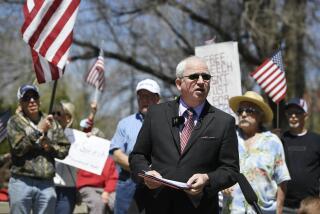Judge Cautions Jurors as They Get North Case
- Share via
WASHINGTON — The judge at Oliver L. North’s trial said today that the jury may consider only in narrowly defined circumstances the former White House aide’s primary defense--that all his actions were authorized by his superiors.
“Neither the President nor any of the defendant’s superiors had the legal authority to order anyone to violate the law,” said U.S. District Judge Gerhard A. Gesell.
“A person’s general impression that a type of conduct was expected, that it was proper because others were doing the same, or that the challenged act would help someone or avoid political consequences, does not satisfy the defense of authorization,” the judge said.
In two hours of instructions to the jury, the judge said North’s defense that he was authorized to cover up his secret role in assisting the Contras may be considered under closely defined circumstances.
North testified that he thought everything he did was legally proper, although he acknowledged he told lies in August, 1986, in concealing from Congress his secret role in assisting the Contras.
“Authorization requires clear, direct instructions to act at a given time in a given way,” Gesell said. “It must be specific, not simply a general admonition or vague expression of preference.”
The jury instructions followed a delay of several hours, due to a news report that two jurors had not admitted involvement in unrelated court actions in the past.
Gesell said North’s lawyers moved for a mistrial because of the jurors failure to acknowledge the previous court action. The judge rejected the motion, and the two jurors remained.
Five alternates have sat with the 12-member jury since opening statements in North’s trial Feb. 21.
ABC News reported that two of the panelists, Caswell G. Hartridge, 61, and Helen G. Lynch, 37, had been named as defendants in civil litigation involving accidents in the early 1980s.
Both answered “no” on jury questionnaires asking them whether they had “ever been involved as a party . . . in any court proceedings (civil or criminal).”
More to Read
Sign up for Essential California
The most important California stories and recommendations in your inbox every morning.
You may occasionally receive promotional content from the Los Angeles Times.













